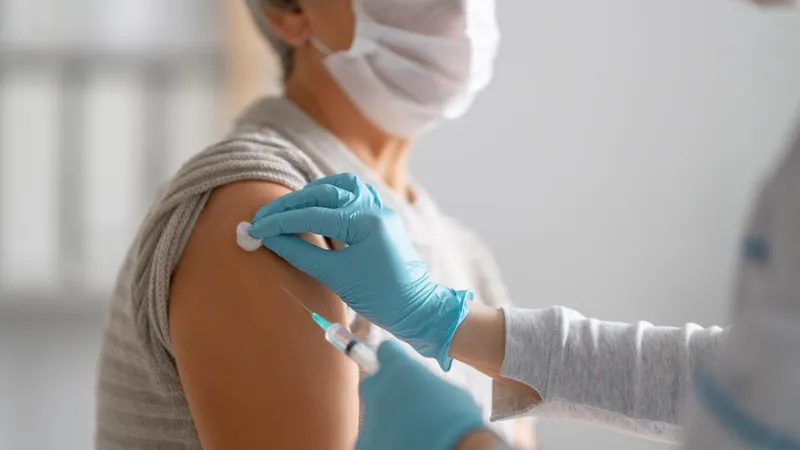
Get Prepared! What You Need to Know About the 2024-2025 Respiratory Virus Season
2024-11-24
Author: Li
Get Prepared! What You Need to Know About the 2024-2025 Respiratory Virus Season
As the respiratory virus season approaches, experts are weighing in on what to expect, and it's time for everyone to take notes. According to Dr. David Ha, PharmD, BCIDP, the respiratory virus season this year may mirror last year's, with predictions suggesting it could be "slightly less intense." However, he cautions that previous predictions have not always gone as expected, leaving room for concern.
During his presentation at the National Community Pharmacists Association (NCPA) Annual Meeting, Dr. Ha, who is the infectious diseases manager at Stanford Health Care, provided vital insights into the vaccines available for four common respiratory viruses. Add to that the latest recommendations from the CDC’s Advisory Committee on Immunization Practices (ACIP), which convened for updates just days before the conference.
COVID-19 Vaccination Updates
This season’s COVID-19 vaccine is not brand new; it represents a modification of existing formulations. The 2024-2025 shot, a monovalent vaccine, specifically targets the Omicron JN.1 SARS-CoV-2 variant. The FDA had previously authorized versions from Moderna and Pfizer, as well as a protein-based version from Novavax, all in August 2024.
Despite the introduction of the new shots, vaccination rates have dipped significantly, indicative of “COVID-19 fatigue.” Patients are increasingly questioning whether it remains necessary to receive yearly vaccinations. Dr. Ha emphasized the importance of sharing safety and efficacy data from the previous season to dispel fears; after all, last year’s monovalent vaccine targeting the SARS-CoV-2 XBB.1.5 sublineage was shown to maintain efficacy across all age groups for at least six months after immunization.
However, current data reveals a concerning trend: only about one-third of eligible individuals are up to date with their COVID-19 vaccinations. With vaccinations predominantly administered at pharmacies, the onus is now on pharmacists and healthcare providers to advocate strongly for vaccinations.
ACIP's Key Recommendations for 2024-2025
At the October 2024 ACIP meeting, several important recommendations emerged:
1. **Second Dose for Seniors**: Adults aged 65 and older should receive a second dose of the COVID-19 vaccine approximately six months after their initial dose.
2. **Immunocompromised Patients**: Those aged six months and older who are moderately to severely immunocompromised are advised to get two doses, with potential for a third dose based on clinical decisions.
3. **Vaccine Interchangeability**: If the same brand is unavailable, mRNA vaccines may be interchanged.
4. **Novavax Vaccine Guidance**: Patients who began their vaccination series with Novavax can switch to mRNA vaccines if it's been over eight weeks since their first dose and no Novavax doses are available.
5. **Self-Identification**: Patients can self-report their immunocompromised status without needing extensive documentation, making it easier for those with conditions like organ transplants or chronic diseases to access the vaccine.
6. **No Specific Timing Required**: High-risk individuals shouldn't delay vaccination, as protection is strongest shortly after the shot. Co-administration with other respiratory vaccines is encouraged to streamline protection.
As we approach the respiratory virus season, now is the time to stay informed and proactive about vaccinations. Ensuring high vaccination rates is crucial, not only for individual health but also for community safety. Remember, your health is in your hands—let’s make informed choices to weather the respiratory virus season together!


 Brasil (PT)
Brasil (PT)
 Canada (EN)
Canada (EN)
 Chile (ES)
Chile (ES)
 España (ES)
España (ES)
 France (FR)
France (FR)
 Hong Kong (EN)
Hong Kong (EN)
 Italia (IT)
Italia (IT)
 日本 (JA)
日本 (JA)
 Magyarország (HU)
Magyarország (HU)
 Norge (NO)
Norge (NO)
 Polska (PL)
Polska (PL)
 Schweiz (DE)
Schweiz (DE)
 Singapore (EN)
Singapore (EN)
 Sverige (SV)
Sverige (SV)
 Suomi (FI)
Suomi (FI)
 Türkiye (TR)
Türkiye (TR)